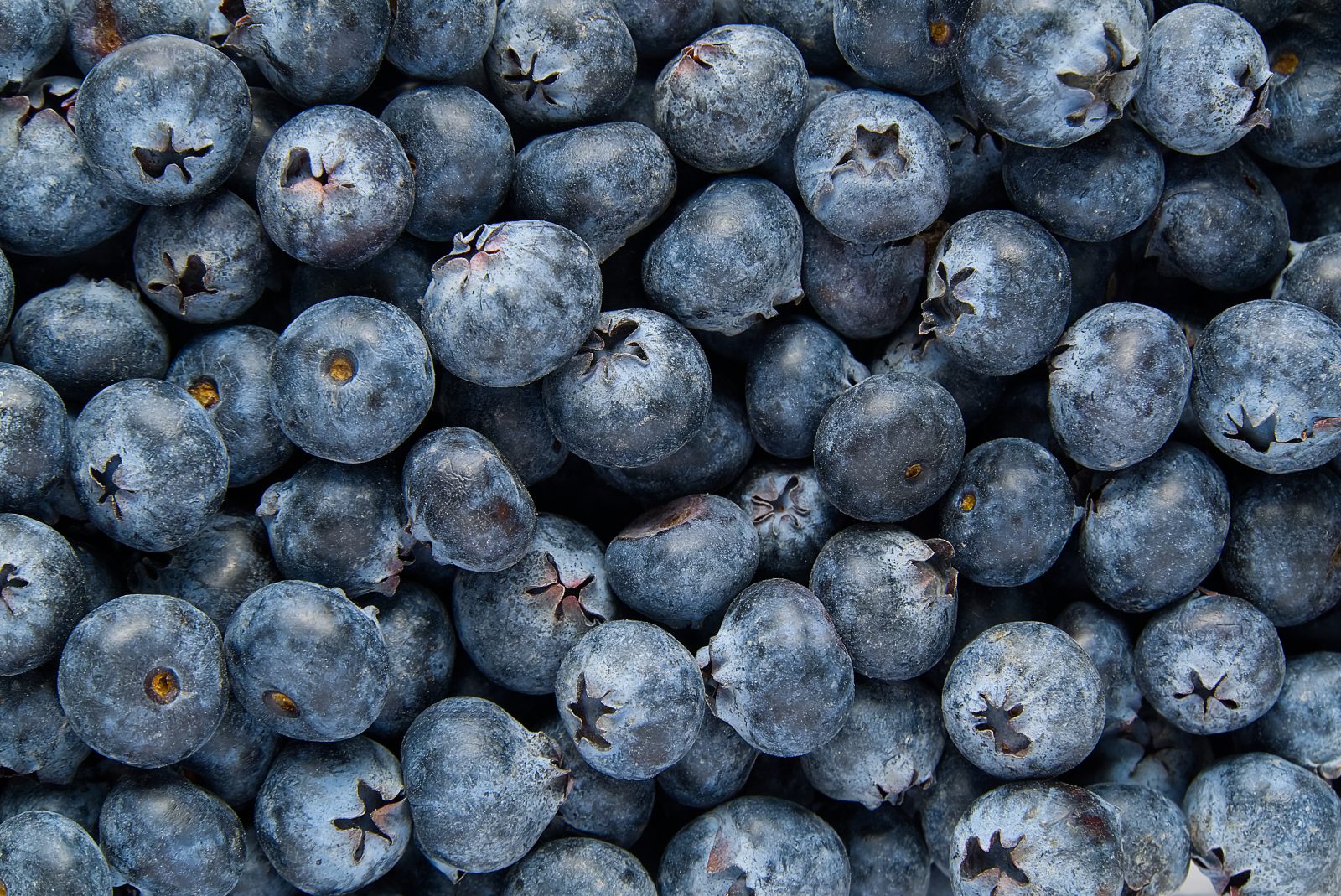Blueberries may be small, but each serving offers immense nutritional benefits. Often overshadowed by more exotic berries, these vibrant fruits are an antioxidant-rich option for anyone who focuses on healthy and balanced nutrition.
They can enhance brain health, support heart health, and offer numerous other health advantages. Besides their impressive benefits, blueberries are also delicious, sweet, and low in calories.
Top Health Benefits of Blueberries
High in Antioxidants
Blueberries are packed with antioxidants, which combat harmful free radicals and prevent cell damage. These antioxidants protect against chronic diseases like cancer, heart disease, and diabetes.
Research has shown that blueberries have a higher total antioxidant capacity than other berries and are particularly rich in phenols, flavonoids, and anthocyanins. Wild blueberries are especially potent, significantly boosting antioxidant status.
Cancer-Fighting Properties
Studies indicate that blueberries can protect against certain cancers. Blueberry extract has been found to inhibit the growth of breast cancer cells and reduce tumor volume.
Additionally, blueberry juice has been shown to curb the growth of various cancer cells, including those of the stomach, prostate, intestine, and breast.
Incorporating a variety of berries and other fruits and vegetables can maximize the cancer-fighting potential of your diet.
Aiding Weight Loss
Blueberries are low in calories and high in fiber, making them an excellent choice for weight loss. Fiber promotes satiety, helping you feel fuller for longer. Animal studies have demonstrated that blueberry juice can prevent obesity and reduce belly fat.
Replacing high-calorie foods with blueberries can contribute to weight loss when combined with a balanced diet and regular exercise.
Boosting Brain Health
Blueberries can enhance brain function, improving memory and cognition. Studies have shown that blueberry consumption can improve cognitive performance and memory in both children and older adults.
The antioxidants in blueberries also protect the brain from free radical damage, promoting healthy brain aging. Other brain-boosting foods include avocados, beets, leafy greens, and walnuts.
Reducing Inflammation
Chronic inflammation is linked to numerous diseases, including cancer, autoimmune conditions, heart disease, and depression. Blueberries have significant anti-inflammatory effects due to their high antioxidant content.
Research has shown that the polyphenols in blueberries reduce markers of inflammation. Including anti-inflammatory foods like celery, broccoli, pineapple, salmon, and chia seeds can further support a healthy, inflammation-free diet.
Supporting Digestion
With 3.6 grams of fiber per cup, blueberries promote regularity and healthy digestion. Fiber adds bulk to the stool, aiding in regular bowel movements. Studies have found that increasing dietary fiber can alleviate constipation.
Combining blueberries with water, physical activity, and other high-fiber foods, such as fruits, vegetables, legumes, nuts, and seeds, can keep your digestive system functioning smoothly.
Promoting Heart Health
Blueberries contribute to a healthy heart by reducing risk factors for heart disease. Research has shown that daily blueberry consumption can lower blood pressure and arterial stiffness.
Blueberries also decrease oxidized LDL cholesterol, a major risk factor for heart disease. For optimal heart health, combine blueberries with a balanced diet, a healthy lifestyle, and regular exercise.
Incorporating Blueberries into Your Diet
Adding blueberries to your diet is simple and delicious. They can be enjoyed fresh, frozen, or dried and incorporated into various dishes.
Here are some creative ways to include blueberries in your meals:
- Smoothies: Blend blueberries with yogurt, spinach, and a banana for a nutritious smoothie.
- Salads: Toss fresh blueberries into a spinach salad with nuts and feta cheese.
- Breakfast: Top your oatmeal, yogurt, or cereal with a handful of blueberries.
- Desserts: Add blueberries to baked goods like muffins, pancakes, or pies.
- Snacks: Enjoy dried blueberries as a convenient on-the-go snack.
Blueberries are a versatile and nutrient-dense addition to any diet, offering numerous health benefits while being low in calories and high in flavor. By incorporating this superfood into your daily meals, you can enjoy the delicious taste and reap the many health advantages they provide.
Nutritional Breakdown of Blueberries
One cup of raw blueberries (about 148 grams) provides:
- Calories: 84
- Protein: 1.1 grams
- Carbohydrates: 21.5 grams
- Dietary Fiber: 3.6 grams
- Fat: 0.5 grams
- Vitamin K: 28.6 micrograms (36% DV)
- Manganese: 0.5 milligrams (25% DV)
- Vitamin C: 14.4 milligrams (24% DV)
- Vitamin B6: 0.1 milligram (4% DV)
- Thiamine: 0.1 milligram (4% DV)
- Riboflavin: 0.1 milligram (4% DV)
- Vitamin E: 0.8 milligram (4% DV)
- Copper: 0.1 milligram (4% DV)
In addition to these nutrients, blueberries contain niacin, vitamin A, folate, pantothenic acid, zinc, iron, magnesium, and phosphorus. They are also rich in beneficial compounds like resveratrol, anthocyanins, phytonutrients, and pterostilbene, which contribute to their wide range of health benefits.
Blueberries vs. Other Berries
When comparing blueberries, blackberries, and raspberries, it’s evident that each berry offers unique nutritional benefits and distinct characteristics, despite their similar sizes and antioxidant properties.
Blackberries are the lowest in calories per gram among the three berries. They are particularly rich in vitamin K, which is essential for bone health and proper blood clotting. Blackberries also provide a good amount of vitamin C and fiber, contributing to overall health and digestive function.
Additionally, blackberries are known for their high levels of anthocyanins, a type of antioxidant that may help reduce inflammation and lower the risk of chronic diseases.
Raspberries stand out for their exceptionally high vitamin C and fiber content. A single serving of raspberries can provide nearly 2.5 times more fiber than blueberries, making them an excellent choice for digestive health.
The high vitamin C content supports immune function, skin health, and the absorption of iron from plant-based foods. Raspberries also contain ellagic acid, an antioxidant that has been studied for its potential anti-cancer properties.
Blueberries are renowned for their higher antioxidant capacity compared to blackberries and raspberries. These antioxidants, including vitamins C and E, and compounds such as anthocyanins and flavonoids, help combat oxidative stress and may reduce the risk of heart disease, cognitive decline, and certain cancers.
Blueberries are also a good source of vitamin K and provide moderate amounts of fiber, contributing to cardiovascular health and digestive regularity.
History and Popularity
Blueberries have a rich history and were highly valued by Native Americans for their medicinal properties. They were later cultivated in the United States, with the first commercial crop sold in 1916. Blueberries have since gained immense popularity and are celebrated for their health benefits.
Potential Risks
Blueberries are generally safe for most people. However, those with a blueberry allergy should avoid them. Additionally, individuals on blood-thinning medications should consume blueberries in moderation due to their high vitamin K content.
Incorporating blueberries into your diet can significantly boost your nutritional intake and provide numerous health benefits. Enjoy them fresh, frozen, or in various recipes to make the most of this superfood.
















Find Us on Socials